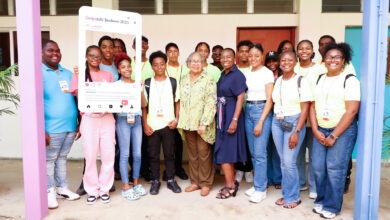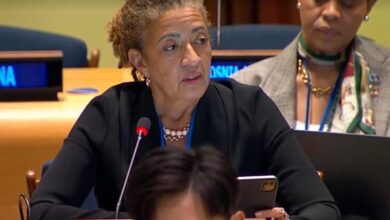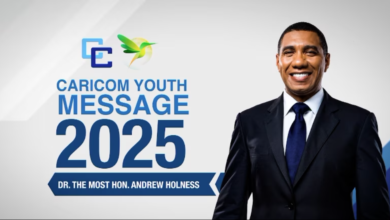If you have ever had the pleasure of witnessing unforgettable history unfold, or experienced the sheer excitement of being on the brink of an experience you’ve only read in books or seen in a film, you might understand the anticipation, and wave of exuberant curiosity that surged upon Jamaica’s shores, in the days announcing 8-9 April 2015.
Certainly a momentous occasion, as youth leaders handpicked by the US Embassy and the White House from every ‘nook and cranny’ of Jamaica’s four corners, arrived on the campus of the University of the West Indies (UWI), Mona summoned by special invitationto the Youth Leaders Town Hall Meeting with President, Barack Obama on 9 April, 2015.
In the hours heralding his arrival at the University’s Assembly Hall, (which had been brilliantly transformed into the Pagoda ‘Oval’ Layout Conference Hall), approximately 350 young leaders, aged 18 – 35 years hailed from nearly every sector of Jamaica’s socio-economic landscape including students (local and exchange), civil society, politics, sports and culture, government and law, business and entrepreneurship, sat eagerly as excitement abounded by the mere thought of the moment in history which by their presence they would help to write.
The mass was pleasantly surprised when Jamaican songstress and season Five Winner of ‘The Voice’,Tessanne Chin graced the stage belting out riveting acoustic styled tunes such as Anything’s Possiblefrom her recently launched album and her debut song in Jamaica Hide-away. She was in part, joined by Jamaican dancehall entertainer, Jeffrey Campbell, better known as Agent Sasco, and the pair delivered tunes that heightened the pride and jubilation of the occasion.
Later on, there was an eruption of loud cheers and excitement in the distance, which foreshadowed the arrival of the sitting 44th President of the United States of America to the keyed-up Conference Hall of Young Leaders.
Given the honour of introducing the President was former Junior Mayor of Montego Bay, 22-year-old student of the University of the West Indies (Mona) Western Jamaica Campus, Aubrey Stewart.
It was quite an honour because I had a chance today to introduce my inspiration. Obama has been my inspiration since I was 14 years old,” noted Stewart.
The US President, who, from all indications, was equally as ecstatic to be in the island state and to meet its youth, greeted the youth leaders with a broad smile and in Jamaican dialect, saying “Greetings massive, wah gwaan Jamaica?”.”Big up”! The young audience cheered passionately, mirroring his warmth and excitement.
The occasion was one which will be renowned in history, as not only was the US President’s visit to the island the first such visit of a sitting President in over 30 years, but it marked the launch of the US$70M Young Leaders of the Americas Initiative (YLAI) and the dawn of a new era of consultative youth engagement with Heads of Government, which is expected to spur similar initiatives both locally and regionally.
The YLAI is valued at approximately JM$8B which will be thrust into a number of projects, geared towards expanding opportunities for emerging entrepreneurs and civil society activities through education, training, networking and employment. The programme is expected to begin initially with 24 youth in the pilot phase, and develop to provide 250 fellowships annually to enable participants from the US and the Region to develop joint business and civil society initiatives. The fellowships will be hosted at universities, incubators and non-governmental organisations across the US, while ensuing exchanges will send Americans to Latin America and the Caribbean and vice versa, to continue the collaboration.
President Obama outlined his focus for the advancement of this initiative, stating,that “these investments will help young people in unemployed, impoverished and marginalised communities and give them a chance to gain the skills they need to compete and succeed in the 21st century.”
In the context of a much desired and growing thrust towards entrepreneurship which has been hindered by a woeful lack of financing to advance the development of Micro Small and Medium-sized Enterprises (MSME’s) across the Caribbean Region, young leaders are elated at the opportunity prospects and timely investment in their development.
Right upon the heels of this announcement, the multi-faceted gathering of youth was also presented the opportunity to engage the US President by ‘Question and Answer’ in a frank discussion, on any issue. Removing his jacket and rolling up his shirt sleeves, appeared not merely an attempt at acclimatization to the tropical climate, but more importantly an indication of his desire to become more relatable to his audience , with whom he was ready to ‘get down to business’. The young audience positively welcomed the opportunity, and eagerly articulated questions on a range of issues as they were selected by a show of hands on an alternating basis of gender; beginning with a female.
Questions fielded by the President addressed a myriad of current affairs issues ranging from the changing Cuba-US relationship and implications for CARICOM, legalization and decriminalization of marijuana, immigration policies and implications for Caribbean nationals, China’s rise to power and its economic influence through investment in the Caribbean Region, Caribbean countries’ engagement of the IMF structural adjustment programmes and issues surrounding debt forgiveness, to highlight a few.
It is noteworthy that Obama’s visit to the Region preceded the 7th Summit of the Americas —the first such summit with the inclusion of all 35 independent countries of the hemisphere, and the first such meeting of Heads of State of both the United States and Cuba, since the restoration of diplomatic relations between both States.
The fact that multilateral dialogue with CARICOM leaders preceded such a watershed moment in the history of our hemisphere speaks to the pivotal role CARICOM can and must play in the amelioration of inter-state relations and the framing of foreign policy Regionally and internationally.
In answering perhaps one of the most intricate of questions posed, pertaining to China’s rise to power, the US President stated explicitly his support for China’s peaceful rise to economic prowess commending their growth as “remarkable”. He further posited that he saw their efforts as resulting in more people being lifted out of poverty in a shorter period of time than [arguably] any time in human history.
He continued by stating that “if China is making investments that are building up infrastructure, or improving education, or helping the people, then we welcome that. We think that’s great. The only thing is you got to make sure you look at what strings may be attached. If the investments are made and it’s solely to build a road to a mine to extract raw materials that are going to then be immediately going to a port and shipped to China, and if Chinese workers are shipped in to build the road and if you don’t know exactly what the deal was with the government that led to China getting the contract in those situations, it may not be, in fact, serving the long-term interests of the country.”
His response was both commendably insightful, and a caution for governments to exercise prudence in accepting investments, from any nation to avoid situations where investors are disproportionately benefiting under guises of investment or aid, which he carefully noted also applies to his homeland state.
As we listened keenly to the discussions, what was evident from all President Obama’s responses was his clearly well informed position on nearly all issues and his ability to deliver same without cue or scripting. His delivery was relaxed yet, charismatic and sagacious as he in most instances contextualized each response such as to clearly elucidate his position.
The youth leaders certainly represented well and articulated well-structured questions. The calibre of questions asked indicated that the attitude and thinking of our youth leaders continue to be elevated. It underscored the need for youthful consultation throughout the Region as we as youth advance and accept our role in shaping a better tomorrow; a tomorrow, for which youth can, will and should be held accountable.
The experience was exciting, enlightening and quite inspiring and undoubtedly unforgettable. However, what was most profound, wasn’t Obama’s eloquent responses or his evidently well thought-out objectives in holding his stately office, but that despite what must be a highly demanding schedule, there was great priority given by US President Barack Obama, to a discussion with young people. This I believe, is quite instructive, and will hopefully mark the dawn of a new era of consultative youth engagement. Is it not time for this consultative type of leadership in the Caribbean?
In the words of this world leader “Change will not come if we wait for some other person or some other time. We are the ones we’ve been waiting for. We are the change that we seek” – Barrack Obama
Written By: Terisa C. Thompson, CARICOM Youth Ambassador, Jamaica
Edited By: Andre S. Marriot-Blake, CARICOM Youth Ambassador, Jamaica






